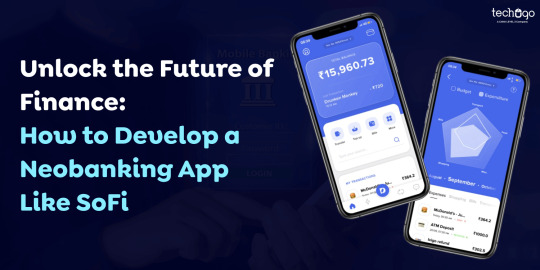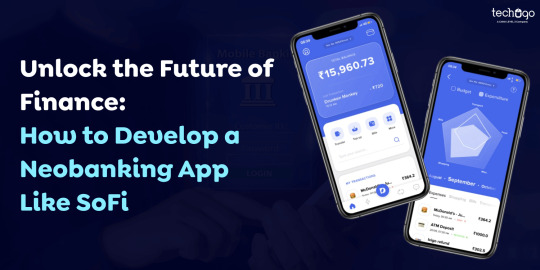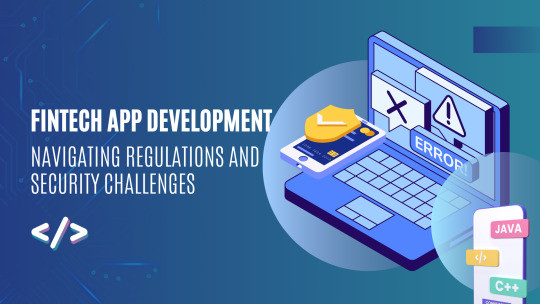#FintechAppDevelopment
Explore tagged Tumblr posts
Text

Flutter Native comparison made simple for Fintech. Learn what works best for your app goals. Read our in-depth guide to make the right choice!
0 notes
Text
AI-Powered React Native Apps for Fintech: Smarter Banking in the UK

The UK fintech sector is growing rapidly, driven by demand for secure, fast, and user-friendly digital banking solutions. Today, fintech companies are not just competing on features or fees, but also on intelligence and personalisation. At the heart of this evolution is the growing use of artificial intelligence in mobile applications. Combined with cross-platform frameworks like React Native, AI is changing how we build and use banking apps.
This article explores the future of ai powered fintech apps uk, focusing on the value of using React Native for building smarter, more efficient mobile experiences for banks and fintech startups across the country.
Why React Native Is a Smart Choice for Fintech App Development
React Native allows developers to build mobile apps for both iOS and Android using a single codebase. This makes it faster and more cost-effective than developing native apps separately. For fintech startups and established banks alike, this translates to quicker time-to-market and more flexibility.
With react native fintech app development, fintech companies can deliver reliable, modern banking experiences while keeping costs under control. The framework also supports integration with advanced AI services and machine learning libraries, making it ideal for smart banking app development uk.
The Role of AI in Fintech Mobile Apps
Artificial intelligence is no longer a futuristic concept in fintech. It's already improving how people interact with their finances in real time. By integrating AI into mobile banking apps, fintech providers can:
Predict user needs
Offer smart spending insights
Detect fraud in real time
Automate support with chatbots
Personalise experiences based on user data
This level of functionality makes ai integration in fintech mobile apps essential for delivering value and staying competitive.
Benefits of AI-Powered React Native Apps in Fintech
When it comes to mobile banking app with ai uk, the combination of React Native and AI provides numerous advantages:
1. Real-Time Personalisation
AI allows apps to understand user habits, spending patterns, and preferences. This data is used to deliver personalised dashboards, tailored notifications, and timely financial advice.
2. Improved Customer Support
AI-powered chatbots can handle simple queries instantly, freeing up support teams for more complex issues. Users can get help 24/7, improving satisfaction and trust.
3. Smarter Security and Fraud Detection
Machine learning algorithms identify unusual account activity, flag suspicious transactions, and reduce false positives. AI helps fintech apps stay ahead of security threats.
4. Faster Development and Lower Costs
By choosing React Native, fintech startups reduce development costs without compromising quality. AI features can be integrated easily through cloud-based APIs or local libraries.
5. Enhanced User Engagement
AI-driven insights like savings tips, spending breakdowns, and goal tracking make users more engaged with their finances, resulting in higher app usage and retention.
Real-World Use Cases in the UK Fintech Industry
Let's explore how companies are applying these technologies in real-world settings:
Digital-First Challenger Banks
UK-based digital banks like Monzo and Starling are leading the way in ai powered fintech apps uk. Their apps use machine learning to sort expenses, provide instant notifications, and detect fraud.
Investment and Wealth Apps
Platforms that help users invest or manage wealth are using AI to offer personalised financial advice and predict market trends. When developed with React Native, these apps reach a wide audience quickly and efficiently.
Budgeting and Expense Tracking Tools
AI helps categorise transactions, spot spending habits, and suggest smarter ways to save. Apps built by uk fintech app development with ai often feature these capabilities as core functions.
How Fintech Startups Can Begin With AI and React Native
For fintech startups, the journey to building an intelligent app can seem complex, but it doesn't have to be. Here are some practical steps:
Start With One Smart Feature Add a chatbot, smart notification system, or simple fraud detection model to start using AI.
Choose a Cross-Platform Framework React Native allows quick development, especially when you're testing new features and gathering user feedback.
Use Pre-Built AI Services Cloud services like AWS, Google Cloud, or Azure offer tools for natural language processing, predictive analytics, and more.
Focus on Data Privacy Ensure compliance with UK data protection laws. Explain clearly how user data is collected and used.
Collaborate With Experts Working with experienced developers who understand react native ai solutions for finance helps avoid costly mistakes and speeds up delivery.
Challenges and Considerations
While the benefits are clear, fintech companies should also consider these challenges:
Data Security: Sensitive financial data must be protected with strong encryption and regular audits.
Regulatory Compliance: UK fintech apps must follow FCA guidelines and data protection laws.
User Trust: Transparency about AI use is critical. Avoid using AI in ways that feel invasive.
Ongoing Maintenance: AI systems need regular updates and monitoring to remain effective.
These challenges are manageable, especially when working with teams experienced in machine learning in uk fintech apps.
The Future of AI in UK Fintech Apps
As technology evolves, so will the expectations of users. Features like voice-enabled banking, biometric security, and predictive investment tools will become standard. Companies that invest in artificial intelligence now will be better prepared to meet future demands.
React Native will continue to play a key role, enabling agile development and efficient updates. For fintech businesses aiming to scale in the UK market, the combination of AI and React Native is a strategic advantage.
Conclusion
AI is not just an add-on to mobile apps anymore. It's becoming the foundation of how financial services engage with users. By embracing ai integration in fintech mobile apps and choosing frameworks like React Native, UK fintech companies can build apps that are smarter, safer, and more user-focused.
From personalised banking experiences to real-time fraud detection, the potential is enormous. Whether you are a startup exploring smart banking app development uk or an established institution expanding into digital services, now is the time to act.
The future of fintech in the UK is intelligent, efficient, and AI-driven.
FAQs
1. What are the benefits of using AI in fintech apps?
AI enhances personalisation, automates customer service, detects fraud, and provides data-driven insights to improve user experience.
2. Can I build a mobile fintech app with both AI and React Native?
Yes, React Native supports integration with various AI tools and services, making it ideal for developing intelligent mobile banking apps.
3. How secure are AI-powered fintech apps?
Security depends on how the app is built. With proper encryption, secure APIs, and regular updates, AI-powered apps can be very secure.
4. Is React Native suitable for high-performance fintech apps?
React Native is suitable for most fintech use cases, especially when performance is optimised and the right native modules are used.
5. Do I need a big budget to add AI to my fintech app?
Not necessarily. Many AI services offer scalable pricing. Starting small with one or two AI features is a cost-effective approach.
0 notes
Text

Digital Payments in Fintech App Development: Key APIs and Tools
As digital transactions dominate, Fintech App Development must adapt. Mobile-first users expect seamless payments, secure onboarding, and multi-device support. Stripe, Square, and Razorpay offer reliable APIs. Firebase, Flutter, and Postman cut dev time.
But security—tokenization, 2FA, and penetration testing—can’t be overlooked. Comply with financial laws to stay ahead. Build apps that users love and regulators trust.
Know more at the blog on Digital Payments in Fintech App Development: Key APIs and Tools
#applicationdevelopmentforiPhone#iosappdevelopmentservices#iphoneappdevelopmentservices#mobilesoftwaredevelopmentcompany#custom app development company#androidappdevelopment#androidappdevelopmentcompany#androidapplicationdevelopmentcompany#fintechappdevelopment
0 notes
Text
Comprehensive Guide to Fintech App Development Trends
Read our latest blog on how fintech apps are changing banking, payments, and finance. We have discussed important trends and tools used to build smart and secure financial apps. Whether it’s mobile banking or payment systems, the blog explains what’s needed to build a reliable app. This blog is for anyone planning to create a fintech app that works well and meets user needs. Learn how fintech development services play a key role in building successful apps. For more information, read our insightful blog!
0 notes
Text
Exploring the Benefits of Fintech App Development Services for Small Businesses

Small businesses face unique challenges and opportunities. One of the most transformative changes is the rise of financial technology, or fintech. Fintech app development services are at the forefront of this revolution, providing innovative solutions that can help small businesses thrive. In this article, we will explore the myriad benefits of Fintech App Development Services for small businesses, highlighting how these services can enhance efficiency, improve customer experiences, and drive growth.
Enhancing Operational Efficiency
One of the primary benefits of fintech app development services is the significant enhancement of operational efficiency. Small businesses often struggle with managing their financial operations due to limited resources and manpower. Fintech apps can streamline various financial processes, such as invoicing, payroll, and expense tracking. Automated systems reduce the need for manual data entry, minimizing errors and freeing up valuable time for business owners and their employees.
For instance, a small retail business can use a fintech app to automatically reconcile sales transactions with bank deposits, reducing the time spent on bookkeeping. This not only ensures accurate financial records but also allows business owners to focus on core activities like customer service and product development.
Improving Access to Financial Services
Access to financial services is crucial for the growth and sustainability of small businesses. Traditional banking institutions often impose stringent requirements and lengthy processes for loan approvals and other financial services. Fintech App Development Services offer a more inclusive approach, providing small businesses with easier access to credit, insurance, and investment opportunities.
Through fintech apps, small businesses can quickly apply for loans, manage their insurance policies, and explore investment options tailored to their specific needs. This level of accessibility empowers small businesses to make informed financial decisions and secure the necessary capital to expand their operations.
Enhancing Customer Experiences
In the competitive market landscape, customer experience is a key differentiator. Fintech app development services enable small businesses to offer seamless and personalized financial services to their customers. Mobile payment solutions, for example, allow customers to make purchases quickly and securely, enhancing their overall shopping experience.
Additionally, fintech apps can integrate loyalty programs, personalized offers, and financial management tools that cater to individual customer preferences. By leveraging data analytics, small businesses can gain insights into customer behavior and preferences, allowing them to tailor their services accordingly. This not only increases customer satisfaction but also fosters loyalty and repeat business.
Ensuring Security and Compliance
Security and compliance are paramount in the financial sector. Small businesses must ensure that their financial transactions and customer data are secure from cyber threats and comply with regulatory standards. Fintech App Development Services prioritize security by implementing advanced encryption technologies, multi-factor authentication, and regular security audits.
Moreover, fintech apps are designed to comply with industry regulations such as the General Data Protection Regulation (GDPR) and Payment Card Industry Data Security Standard (PCI DSS). This ensures that small businesses can operate with confidence, knowing that their financial operations meet the required legal and security standards.
Driving Innovation and Competitiveness
Innovation is a driving force behind the success of small businesses in the fintech sector. Fintech app development services provide small businesses with cutting-edge tools and technologies that foster innovation. From blockchain-based solutions to artificial intelligence-driven analytics, fintech apps offer a wide range of functionalities that can transform business operations.
By adopting fintech app development services, small businesses can stay ahead of the competition by offering innovative solutions that meet evolving customer demands. For example, a small business in the e-commerce sector can use a fintech app to implement a buy-now-pay-later (BNPL) option, attracting more customers and increasing sales.
Winding Up
Fintech App Development Services offer numerous benefits for small businesses, from enhancing operational efficiency and improving access to financial services to ensuring security and driving innovation. By leveraging these services, small businesses can streamline their financial processes, offer superior customer experiences, and maintain a competitive edge in the market.
As the fintech landscape continues to evolve, it is imperative for small businesses to embrace these technological advancements. Partnering with a reliable provider of fintech app development services can unlock new opportunities and pave the way for sustainable growth and success.
By integrating fintech solutions into their operations, small businesses can not only overcome their current challenges but also position themselves for future growth in an increasingly digital economy.
#FintechAppDevelopment#FintechServices#SmallBusinessSolutions#DigitalTransformation#FinancialTechnology#BusinessGrowth#AppDevelopment#FintechInnovation#TechForSMEs#MobileBanking
0 notes
Text
Top Fintech App Development Companies: How to Pick the Right One?

Choosing the right fintech app development company is crucial for building a secure and scalable financial solution. With numerous options available, businesses must evaluate expertise, portfolio, and security measures. A top-tier company ensures compliance with regulations, seamless user experience, and advanced financial features. Whether you need a banking, investment, or payment solution, selecting a reliable development partner guarantees success. Explore key factors to find the best company for your fintech product.
#fintechappdevelopment#fintechappdevelopmentcompany#fintechappdevelopmentcompanyinAustralia#fintechmobileappdevelopment#fintechmobileappdevelopmentcompany
0 notes
Text
Fintech App Development Company in Chicago – SMT Labs Private Limited
In today’s digital world, the demand for Fintech apps is skyrocketing! As a leading financial hub, Chicago is at the heart of Fintech innovation. If you're looking to build a secure and innovative Fintech app, SMT Labs Private Limited is your trusted development partner.

What is Fintech App Development? Fintech combines finance and technology to offer seamless banking, payments, investments, and more. A great Fintech app makes these services fast, easy, and secure.
Why Fintech Development Matters in Chicago Chicago's thriving financial sector drives a high demand for advanced Fintech solutions. To succeed, you need a tech partner that understands security, compliance, and innovation.
SMT Labs Private Limited — Leading Fintech App Development Company We deliver cutting-edge, secure, and scalable Fintech apps tailored to your business needs.
Our Services:
Payment Gateway Integration
Digital Wallet Development
Blockchain-Based Solutions
P2P Lending Platforms
Budget Management Apps
Crypto & Trading Platforms
Our Development Process:
Understanding Requirements
UI/UX Design
App Development
Security Integration
Testing & Deployment
Maintenance & Updates
Key Features:
Bank-level security & encryption
AI & Machine Learning integration
Cross-platform development (Android, iOS, Web)
Seamless, user-friendly interfaces
Why Choose SMT Labs Private Limited?
Experienced developers & technical experts
Compliance with US & international regulations
24/7 technical support
Innovative, customized solutions
Let’s Build Something Amazing! Looking for a reliable Fintech app development company in Chicago? SMT Labs Private Limited is your go-to partner for digital success. Contact us today to bring your Fintech idea to life!
FAQs:
What is Fintech app development? Digital financial services apps for banking, payments, and investments.
Technologies used? Blockchain, AI, ML, cloud computing, encryption.
Features of a secure Fintech app? Data encryption, multi-factor authentication, fraud detection.
Do you develop crypto and blockchain apps? Yes, we build secure trading platforms.
Development time? 3-6 months, depending on complexity.
Cost? Varies with features and platforms — contact us for a quote.
Support & maintenance? Yes, we provide ongoing updates and support.
Visit our website or contact us for more information. Let’s create the future of Fintech together!
#FintechAppDevelopment#ChicagoTech#FintechSolutions#MobileAppDevelopment#TechInnovation#BlockchainApps#DigitalFinance#SMTLabs#FintechExperts#AppDevelopmentCompany#smtlabs
0 notes
Text
What's the Investment Required to Develop a Fintech App Like Myfawry?

Wondering about the investment needed to develop a Fintech App Like MyFawry? This guide breaks down the costs associated with building a similar platform, including development, features, security, and maintenance. Learn how to budget effectively and gain insights into the financial considerations for launching a successful fintech app.
#applicationlikemyfawry#fintechappdevelopment#fintechapplikemyfawry#mobileappdevelopmentcompany#paymentappy
0 notes
Text
Discover the factors influencing the cost of developing a payment app like Zain Cash. From design and features to platform selection and security measures, this guide breaks down the key aspects that affect the budget. Learn about development timelines, essential integrations, and the role of advanced technologies like AI and blockchain. Whether you’re building for Android, iOS, or both, get a clear estimate and insights to make informed decisions for your payment app development project.
#paymentapplikeZainCash#applikeZainCash#fintechapplikeZainCash#ZainCashMobileApp#paymentappdevelopment#mobileappdevelopment#fintechappdevelopment
0 notes
Text
Transforming FinTech in the UK: The Role of React Native in Building Secure Financial Apps
React Native is playing a crucial role in transforming the UK’s FinTech industry by enabling the creation of secure, high-performance financial applications across multiple platforms. As a leading FinTech app development company, we specialize in React Native app development, offering scalable, cost-effective solutions that don’t compromise on security or user experience. By streamlining the development process, React Native allows FinTech businesses to quickly deploy innovative apps that meet the growing demand for secure and reliable digital financial solutions. With its ability to deliver consistent performance on both iOS and Android, React Native is quickly becoming the go-to framework for building robust financial applications that drive digital transformation in the FinTech sector.
Read More - https://blog.zamstudios.com/transforming-fintech-in-the-uk-the-role-of-react-native-in-building-secure-financial-apps/
0 notes
Text
Reinventing the Financial Landscape Via AI in Banking

AI in Banking is revolutionizing the financial landscape by streamlining operations, enhancing customer experiences, and boosting decision-making efficiency. Through advanced algorithms and machine learning, banks can predict market trends, detect fraud, and personalize services, ensuring higher customer satisfaction. AI-driven chatbots and virtual assistants provide seamless support, while predictive analytics optimize loan approvals and risk assessments.
#AIinBanking#mobilebankingapp#fintechappdevelopment#AIappdevelopment#mobileappdevelopment#Bankingapps
0 notes
Text
Crafting Success: A Comprehensive Guide to Developing Wealth Management Apps

Discover how to create a cutting-edge Wealth Management App that empowers users to manage investments, track financial goals, and streamline asset management. This guide covers essential features, development steps, and strategies to ensure a seamless user experience and long-term success.
#bestwealthmanagementapps#fintechappdevelopment#mobileappdevelopmentcompanyinCanada#WealthManagementApp
0 notes
Text

How much does it cost to develop P2P payment apps like PayPal
Developing a P2P payment app like PayPal involves various factors, including advanced features like secure transactions, user authentication, and payment gateways. The cost depends on app complexity, design, and compliance with financial regulations. Adding features such as multi-currency support and real-time notifications may increase the budget. USM Business Systems is the best mobile app development company, offering top-notch solutions for P2P payment app development.
USM Business Systems
Services:
Mobile app development
Artificial Intelligence
Machine Learning
Android app development
RPA
Big data
HR Management
Workforce Management
IoT
IOS App Development
Cloud Migration
#P2PPaymentAppCost#PayPalAppDevelopment#PaymentAppCosting#FintechAppDevelopment#P2PAppFeatures#MobilePaymentSolutions#PaymentAppDevelopment#CostToDevelopApps#SecurePaymentApps#USMBusinessSystems
0 notes
Text
Unlock the Future of Finance with Neobanking: How to Build an App Like SoFi

Discover how to create a cutting-edge financial app by building a neobank like SoFi. Learn the essential features, technologies, and strategies to develop apps like SoFi that can disrupt traditional banking. From digital accounts to investment services, unlock the potential of neobanking and offer a seamless, user-friendly platform that meets modern financial needs.
0 notes
Text
How to Develop a Neobanking App Like SoFi

Creating apps like SoFi requires understanding neobanking fundamentals, user-centered design, and robust financial security. By integrating real-time analytics, seamless user interfaces, and multi-functional features, you can build a secure and engaging neobanking app. Explore how to structure, design, and launch a fintech solution that offers modern financial services, mimicking SoFi's innovation and success.
0 notes
Text
Fintech App Development: Navigating Regulations and Security Challenges

The rapid growth of fintech has revolutionized the financial services industry, making it more accessible, efficient, and user-friendly. However, with this innovation comes increased scrutiny and a complex regulatory landscape that developers must navigate carefully. In addition to regulatory compliance, ensuring robust security measures is critical, given the sensitivity of financial data. Here’s a breakdown of the key regulations and security challenges in fintech app development and how to tackle them.
1. Understanding the Regulatory Landscape
Fintech operates in a highly regulated environment, with different regions imposing specific rules to ensure consumer protection, financial stability, and data privacy. Before developing a fintech app, it's essential to understand the local and international regulations that apply to financial services.
Key Regulations to Consider:
GDPR (General Data Protection Regulation): For apps operating in or serving users in the EU, GDPR is a critical regulation that governs how personal data is collected, processed, and stored. Failure to comply can result in hefty fines.
PSD2 (Payment Services Directive 2): Applicable in Europe, PSD2 is designed to enhance payment security, promote innovation, and boost competition. It requires strong customer authentication (SCA) and opens up access to customer data through APIs.
PCI DSS (Payment Card Industry Data Security Standard): For apps handling payment card transactions, PCI DSS sets the standard for securing cardholder data. Compliance is mandatory to avoid data breaches and penalties.
FINRA (Financial Industry Regulatory Authority): In the U.S., FINRA regulates securities firms and brokers. Fintech apps offering investment services must adhere to its rules regarding transparency and fair practices.
2. Licensing and Compliance
Fintech apps often need specific licenses to operate, depending on the services offered (e.g., lending, digital banking, payments). The process for obtaining these licenses varies by jurisdiction but often includes meeting capital requirements, demonstrating secure infrastructure, and proving compliance with anti-money laundering (AML) and know-your-customer (KYC) regulations.
Licensing Requirements:
E-money licenses for payment and money transfer apps.
Banking licenses for neo-banks or challenger banks.
Broker-dealer licenses for apps offering trading and investment services.
Lending licenses for peer-to-peer lending or microfinance platforms.
Each license comes with its own set of ongoing compliance requirements, which fintech companies must adhere to maintain their operational status.
3. Security Challenges in Fintech Development
Given the sensitive nature of financial data, security is a top priority in fintech app development. The increasing number of cyberattacks targeting financial services means that fintech apps must implement best-in-class security practices to protect both the app and its users.
Key Security Challenges:
Data Encryption: All sensitive data (e.g., financial transactions, personal information) must be encrypted both in transit and at rest. Encryption ensures that even if data is intercepted, it cannot be accessed without the appropriate decryption key.
Secure Authentication: Implementing multi-factor authentication (MFA) and biometric authentication (e.g., fingerprint, facial recognition) is essential for protecting user accounts from unauthorized access.
Fraud Detection: Fraud detection systems that use machine learning to detect unusual transaction patterns or activities can help prevent fraud before it occurs.
API Security: Many fintech apps rely on third-party APIs for services like payment processing or account aggregation. Ensuring these APIs are secure and protected against vulnerabilities (e.g., token-based authentication, OAuth) is crucial.
Continuous Monitoring: Security doesn’t end at deployment. Continuous monitoring and threat detection systems help identify potential vulnerabilities and respond to incidents in real time.
4. Balancing Security and User Experience
While security is a priority, user experience remains equally important. If a fintech app’s security measures are too cumbersome, users may abandon the app for easier alternatives. Developers need to strike a balance between high-level security and seamless usability.
Key Considerations:
Streamlined Authentication: Offering secure, yet convenient authentication options, such as biometric login, can enhance user experience without compromising security.
Clear Security Features: Educating users about security features (e.g., 2FA setup, password management) can build trust and ensure that users follow best practices.
Minimizing Data Collection: Collecting only the necessary data reduces the app’s attack surface and simplifies compliance with privacy regulations.
5. Adapting to Emerging Threats and Technology
As technology advances, so do the methods used by cybercriminals. Fintech developers must stay ahead by regularly updating their security protocols, integrating the latest technologies, and adapting to new threats.
Emerging Trends:
Blockchain: Many fintech apps are exploring blockchain to secure transactions and improve transparency. Blockchain’s decentralized nature reduces the risk of fraud and improves trust between parties.
AI and Machine Learning: AI is becoming crucial for fraud detection and risk management. Machine learning models can analyze user behavior and identify anomalies in real time.
Quantum Computing: While still in its early stages, quantum computing presents a potential future challenge for encryption methods currently used in fintech. Developers must keep an eye on this technology and prepare for how it may impact cryptography.
6. Handling Data Privacy and User Trust
Fintech apps handle massive amounts of sensitive data, from personal details to financial transactions. Protecting user privacy and building trust is paramount, especially in an industry where data breaches can be catastrophic.
Strategies for Data Privacy:
Data Minimization: Collect only the data necessary for the app to function, reducing the risk of exposure in the event of a breach.
Consent Management: Ensure that users understand what data is being collected and for what purpose. Implement clear and user-friendly consent processes that comply with regulations like GDPR.
Anonymization: Where possible, use data anonymization techniques to protect user identity while still gathering valuable insights.
7. Ongoing Compliance and Audits
Even after launch, fintech apps must continuously meet regulatory requirements through regular audits and compliance checks. Failure to do so can result in heavy penalties, loss of licenses, and damage to reputation.
Ongoing Compliance Steps:
Internal Audits: Conduct regular internal audits to ensure that the app complies with regulatory requirements and security standards.
Third-Party Audits: Engage third-party firms to conduct security audits and vulnerability assessments.
User Data Audits: Regularly review how user data is collected, stored, and processed to ensure that privacy laws are adhered to.
Outcome
Developing a fintech app requires navigating a complex web of regulations and security challenges. By prioritizing compliance from the outset, implementing cutting-edge security measures, and balancing user experience with data protection, fintech companies can build robust and trustworthy apps that meet the needs of both users and regulators. Staying informed about the evolving regulatory landscape and emerging security threats will be key to long-term success in this rapidly growing industry.
#FintechAppDevelopment#RegulatoryCompliance#SecurityChallenges#AppSecurity#FintechRegulations#DataPrivacy#Cybersecurity#FintechCompliance#SecureDevelopment
0 notes